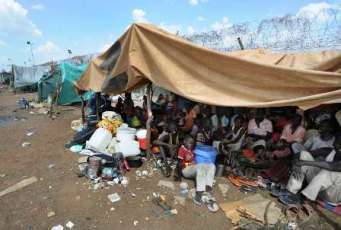Sudan agrees with UN on joint mechanism to provide aid in conflict zones
April 25, 2012 (KHARTOUM) – The Sudanese government has agreed with the United Nations (UN) on establishing a joint mechanism to coordinate aid efforts in conflict-affected areas, state media reported on Wednesday.

The two states have since last year been the scene of conflict between the Sudanese government and rebels who fought as part of the army of neighbouring South Sudan, which split to form an independent state in July last year.
“Sudan and the UN have agreed to form a joint mechanism to manage coordination between UN agencies and the Sudanese Humanitarian Aid Commission on providing humanitarian assistance to affected areas,” two state media outlets, Sudan News Agency (SUNA) and Sudanese Media Center (SMC), reported.
According to the two agencies, the agreement was reached during a meeting held Thursday between Sudan’s social welfare minister, Amira al-Fadil, and representatives of UN agencies in the country, including UNDP representative Ali Hassan Al Zaatari.
The meeting, however, put a caveat that UN agencies must “commit to the directives established by the state in providing humanitarian and development assistance.”
Citing security concerns over assistance reaching rebels and fearing a replay of the crisis in the western region of Darfur, Khartoum was initially opposed to any form of international humanitarian intervention in the two states. It even put greater restrictions on the operations of aid groups already existing in the two regions.
As pressure mounted, with the US forcing a delay of an international conference planned to discuss mitigating Khartoum’s economic difficulties following the secession of South Sudan. After this, Khartoum began to soften its stance but insisted that the role of foreign aid groups must be confined to assisting local organisations.
Khartoum also downplayed concerns by the international community over the dire humanitarian situation in the two states, saying that a survey it conducted in February proved that the situation in South Kordofan was normal.
Similarly, Thursday’s meeting, according to SUNA, laid stress on the “non-existence of a food crisis for the time being.”
The Sudanese minister Amira al-Fadil gave UN representatives a briefing on the humanitarian situation in South Kordofan and Blue Nile, focusing, as reported by SUNA, on Heglig and Talodi towns where she said the situation was stable and aid assistances was being provided to “15,000 families affected by fighting around Talodi.”
State media quoted the UN representative as describing the meeting as “positive” and saying he was “very happy” with its outcome.
UN agencies estimate that more than 415,000 people have been displaced since the fighting erupted in South Kordofan in June and spread to Blue Nile in September.
Even if the Sudanese government does allow aid groups into the two states, many expect Khartoum to deploy its expertise in using bureaucratic obstacles to hinder the operations.
(ST)
